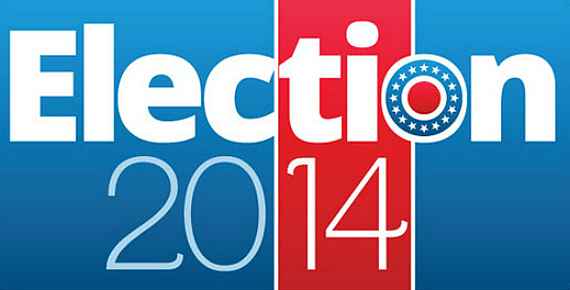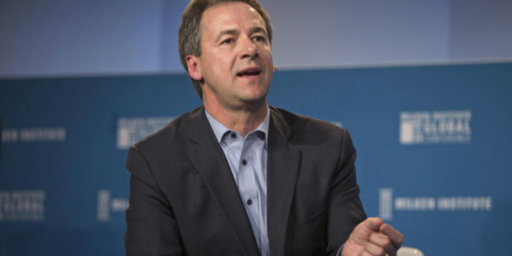Odds Point To A GOP Senate Takeover
Signs continue to suggest that a GOP Senate takeover is likely.
Nate Silver’s latest projection of the odds of a Senate takeover by the Republican Party are about the same as the initial projection he posted a couple months back:
We last issued a U.S. Senate forecast in mid-March. Not a lot has changed since then.
The Senate playing field remains fairly broad. There are 10 races where we give each party at least a 20 percent chance of winning,1 so there is a fairly wide range of possible outcomes. But all but two of those highly competitive races (the two exceptions are Georgia and Kentucky) are in states that are currently held by Democrats. Furthermore, there are three states — South Dakota, West Virginia, and Montana2 — where Democratic incumbents are retiring, and where Republicans have better than an 80 percent chance of making a pickup, in our view.
So it’s almost certain that Republicans are going to gain seats. The question is whether they’ll net the six pickups necessary to win control of the Senate. If the Republicans win only five seats, the Senate would be split 50-50 but Democrats would continue to control it because of the tie-breaking vote of Vice President Joseph Biden.
Our March forecast projected a Republicans gain of 5.8 seats. You’ll no doubt notice the decimal place; how can a party win a fraction of a Senate seat? It can’t, but our forecasts are probabilistic; a gain of 5.8 seats is the total you get by summing the probabilities from each individual race. Because 5.8 seats is closer to six (a Republican takeover) than five (not quite), we characterized the GOP as a slight favorite to win the Senate.
The new forecast is for a Republican gain of 5.7 seats. So it’s shifted ever so slightly — by one-tenth of a seat — toward being a toss-up. Still, if asked to place a bet at even odds, we’d take a Republican Senate.
Silver bases the forecast on a number of factors:
- President Obama remains fairly unpopular with an approval rating of about 43 or 44 percent. His numbers haven’t changed much since March (perhaps they’ve improved by half a percentage point). It may be thatmodestly improved voter perceptions about the economy are being offset by increasing dissatisfaction of his handling of foreign policy.
- The generic congressional ballot remains very close between Democrats and Republicans and also has not changed much since March. Note, however, that many generic ballot polls are conducted among registered voters; a tie among registered voters usually translates to a small Republican advantage among likely voters.
- Both Democratic and Republican voters report lower levels of enthusiasm today than they did in 2010 (perhaps for good reason). But Republican voters are more enthusiastic than Democrats on a relative basis. That will potentially translate to an “enthusiasm gap” which favors the GOP, but not as much as it did in 2010.
- Republicans’ recruiting of viable candidates is going better than in 2010 and 2012 although not uniformly so: they face potential issues in Mississippi and Oregon, for instance.
- The quality of polling is somewhat problematic. Much of it comes from firms like Public Policy Polling and Rasmussen Reports with dubious methodologies, explicitly partisan polling firms or new companies that so far have little track record. As a potential bright spot for Democrats,polling firms that use industry-standard methodologies seem to show slightly better results for them, on average. However, these high-quality polls are mostly reporting results among registered voters only, rather than likely voters. Thus, they aren’t yet accounting for the GOP’s potential turnout advantage.
Meanwhile, the guys over at the Upshot, which seems to be the New York Times effort to come up with a replacement for Silver, are also projecting that the GOP is slightly favored to gain control of the Senate based on the polling as of today:
As I’ve noted before, the odds have always been in favor of the GOP gaining a slight majority in the Senate, or at least coming very close to doing so. Seven seats held by Democratic incumbents are in states that Mitt Romney won in 2012, all the GOP has to do is win six of those seats and they’ve got control of the Senate. That’s easier said than done, of course, and it assumes that the GOP holds on to all of seats that it has up this year, including seats in Kentucky and Georgia that, at the very least, will be the subject of intense media speculation over the next five months.
There are several states where it seems fairly clear that the GOP will assuredly pick up a Democratic seat. Specifically, we’re talking here about Montana, South Dakota, and West Virginia. In Montana, Republican Steve Daines is maintaining a steady lead over former Lt. Governor John Walsh, who was appointed to fill the remainder of Max Baucus’s term when he was appointed Ambassador to China. While it’s true, as Silver notes, that Montana. Similarly, former South Dakota Governor Mike Rounds has a huge lead over Democratic nominee Rick Weiland, who seems to be clearly being hurt by the independent candidacy of former Senator Larry Pressler. While this race could theoretically change if Pressler drops out of the race or his support drops away, right now this seems solidly Republican. Finally, Congresswoman Shelly Moore Capito continues to maintain a double digit lead in West Virginia, and there’s little indication that national Democrats are going to put many resources into this race.
So that theoretically at least gives the GOP three pickups, but things aren’t quite as clear in the remaining four seats. In Arkansas, Mark Pryor maintains a narrow edge over Congressman Tom Cotton and so far at least seems to be running a fairly good campaign. The situation in Louisiana remains as murky as politics in that state have always been, with Senator Mary Landreiu maintaining a lead over the entire field in the open primary that the state has on Election Day, but Congressman Bill Cassidy with a slight lead over Landrieu in the head-to-head race the two would face about a month later. In Alaska, Mark Begich has narrow leads over the two leading contenders for the Republican nomination but with that primary so late in the cycle it’s hard to be able to tell what’s going on there. Personally, I’d give the edge to the GOP up there but it’s too early to tell for sure. Finally, Thom Tillis and Kay Hagan are essentially tied in North Carolina. All four of these races could go anywhere, but if the national trend turns strongly in favor of the Republicans then it seems likely that most of them will start tilting that direction as well. Again, all the GOP needs to do is win three of these races, along with the three set forth above, in order to win the Senate.
In addition to these six seats, there are races in three other states with Democratic Senators that could potentially tilt Republican. Right now, the most promising race in this group for the GOP is in Iowa, where Joni Ernst, fresh off of her victory in the GOP Primary is running neck and neck with Congressman Bruce Braley for the seat being vacated by Tom Harkin. A less likely prospect for the GOP is Michigan, where TerryLynn Land is at least staying close to Congressman Gary Peters. However, this being Michigan I am skeptical about the ability to pull off a Senate victory here. Much of the outcome there may depend on what happens in the other statewide races, especially the re-election bid of Governor Rick Snyder. The final GOP long shot state is Oregon, where many Republicans are putting their hopes on Dr. Monica Wehby to unseat Jeff Merkeley. Based on the polls so far, though, there does’t seem to be much of an anti-Merkley swing in the Beaver State.
Lastly, of course, there are the two Republican seats that may or may not be vulnerable in 2014. The Georgia race won’t be finalized until the Republicans hold their runoff in July, but for the moment at least Michele Nunn seems to be competitive. Based on recent polling, though, it seems clear that in the end the GOP will hold on to this seat. The situation is similar in Kentucky, where Mitch McConnell is holding off a seemingly strong challenge from Alison Lundergan Grimes. As with his battle for the GOP nomination, though, it seems likely that McConnell will hold on for a narrow win.
Adding it all up, I’d say that the GOP has a very good shot at getting at least the 51-49 majority that will give them control of the Senate, a majority that may be enhanced by victories in states like Iowa or Michigan, or by the decision of Maine Senator Angus King to caucus with the GOP starting in 2015. Whether this holds through November is, of course, a different question entirely.








Then we’re screwed.
A Republican controlled Senate would be so good for the Republic…then the Senate can hold 50 cotes to repeal Obamacare too!!!
The Republicans holding both the House and the Senate are going to find that they’re in the position of the dog that chased the car and caught it.
Now what? They’re going to have to actually do something productive. And bringing impeachment proceedings against President Obama does NOT fall in that category….
I also suspect we’ll immediately start to see a ding-dong catfight between the Establishment Republicans and the Tea Partiers. Then we’ve got the neo-cons, who are salivating at the prospect of attacking Iran. I think they’re going to find that the average American isn’t too interested….
What matters now is trends. The election won’t be held today-it will be in 5 months. Right now the GOP is favored to take over, but the trend is moving in favor of the Democrats. I’m sticking with my prediction that the Dems will hold on.
This paragraph from Silvers might be key:
Let’s wait for the algorithmic forecast before we Democrats start panicking.
Maybe then Republicans can do something about spree shootings other than bending over for the NRA.
I say what I said the last time Nate made his forecast. There’s no such thing as a tenth of a seat (and I know he’s citing probabilities). But 5.7 means that Republicans will either gain 5 seats or 6 seats. I continue to say they’ll gain 5 seats which means the Democrats will hold the Senate.
Let me guess, nonstop hearings on Obamacare, Benghazi, Bergdahl. Impeachment hearings and votes. No legislation will be passed. Great way to go into 2016. Can you say President Hillary Clinton?
@dennis: No! You’re looking at this the wrong way (unless you’re a Republican, of course); now they’ll have no reason not to unveil their health plan. I mean that’s really good news since we’ve been hearing about how great it would have been if only they had gotten to show it to us.
Or, they have to admit that they are “Oz the great and powerful.” Who’s screwed?
@grumpy realist: @DC Loser:
Unfortunately for the rest of us, for the Gop constituency impeachment proceedings are productive. Which brings us to DC Loser’s observation. And note that sometime over the weekend Hillary shifted from “not gonna run, nuh-huh” to “I’ll decide sometime before the end of the year.” That shift is important.
So what will Republicans do when they actually control one whole branch of government? Will they finally take responsibility for governing rather than having sham votes and conducting other meaningless activities? As others have noted, Republicans will make it far easier for Hillary to stroll right into the White House in 2016 should they retake the Senate…
It is too early people. In August of 2012, using the same system he has now Nate predicted that there was a 61% chance that the repub would take the senate. And the repubs ended up losing 2 seats.
Last time all the early indicators, which are just moonshine and chicken entrails, point to repub victory. But once the head to head polls came out in Sept, it became clear the repubs were in trouble.
I love Nate but he is at his best when he can analyize head to head polls, lots and lots of head to head polls. You get plenty of those in prez races, which is why he is dead on in prez races. But there are not very many of them for the Senate races right now. Wont be until late Sept.
My predictions:
The result will be near even and the Senate will be deadlocked.
There will be two years of grandstanding and nothing of substance will move through congress.
If the Republicans do get 6 or more and take control then almost everyone’s attitudes on the filibuster will change.
Maybe they’ll vote to deport themselves to their fatherland – North Korea. I doubt that Obama would veto the bill.
Oh please, the Republicans govern? They said that when they got control of the House and what did we get other than a deck of cards’ worth of Obamacare repeal votes?
Presuming that the Gas-n-Oil Party does take the Senate, I think Ms GrumpyRealist is correct, we will see a wonderful and entertaining blood-letting between the likes of Sen McDaniel and the likes of Sen Graham. And nothing would be as unifying as an Impeachment, now would it?
Which leads us to the Democratic sweep of 2016 that leaves Repubs with less than 1/3d in both houses! And the second President Clinton!
How do I know this, you ask? Because the average FauxNoise viewer is a 70yr old white male. The actuarial expectation is that 2.45% of that group dies annually. So in ’16, there will be almost 5% fewer of them (more accurately “us” — since I am almost there meself!).
At the same time, the Millennials, an even larger larger number of persons than the BabyBoomers, will have established a preference for issues such as same-sex-marriage, activist government and legal marijuana.
Enjoy these next two years. Their like will not soon come again. Thank God!
@Just ‘nutha’ ig’rant cracker:
“Their health plan”?
The best plan would be removing government totally from the process as step one.
@Eric Florack:
Yup, a complete laissez faire capitalist medical system, what could go wrong?
@Eric Florack: So how do you expect to protect people with “previous conditions” from being dumped by their insurance companies?
The fact is, all of us as we get older, develop stuff that could be used as an excuse to throw us off health insurance.
You willing to jump first?
@grumpy realist: Perhaps our friend is thinking in terms of future markets. Maybe as well as a perfectly happy end to life, the Soylent Corp. would offer money for the previously afflicted to become food for the lucky never-ill. He is after all a gentleman with soaring imagination.
There is no way that the Republicans regain control of the Senate. Since Republicans always under perform, they would need to be in the polling lead in at least enough races to give them a 53 vote edge in the Senate. Yet, there is no way that is going to happen.
And even if the Republicans get 50 seats in the Senate, it will have zero effect on policy or governance; the Democrats will easily get the seats back in 2016, and policy will continue on its current path. The next really relevant elections in U.S. politics will be in 2022 when the Democrats regain control of the House and virtually everyone will admit that the Republicans are removed from being politically relevant and the U.S. is a de facto one party state.